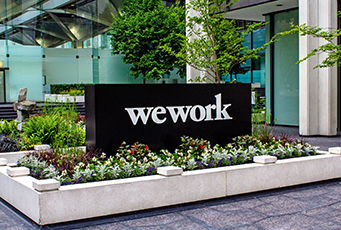
Back in July when we first discussed WeWork, this fast-growing but money-losing venture was one of the most talked-about IPOs in years. At that time, we noted that it was too early to say what would happen, but “it should be very interesting to watch it all play out.” Turns out, that was a massive understatement!
What WeWork Does
Here’s some background. WeWork, now known as We, provides shared office space for businesses. Individual office spaces are furnished and come complete with Wi-Fi. We leases large spaces under long-term deals and then sublets space to tenants, dividing it up to accommodate each tenant’s specific space needs. While We is responsible for the long-term lease, it holds tenants to only short-term leases.
What’s Happened Since Our Last Evaluation?
In short, a lot! Here’s the timeframe. We released its initial public offering (IPO) application with the U.S. Securities and Exchange Commission on August 14th. Previously it had filed only a confidential application. On September 17th, as questions about the company’s worth mounted, the IPO was postponed for at least a month. On September 24th, the company’s charismatic founder, Adam Neumann, resigned as CEO under pressure. Then, on September 30th, the IPO was postponed indefinitely. What was once touted as a potentially sizzling financial prospect appears to have fizzled out.
What Went Wrong?
In our previous article, we touched upon some of the potential issues surrounding We. Of those, the company’s lack of profitability and its corporate governance shortcomings were the driving forces behind the eventual postponement.
Despite its lack of profitability, the company’s growth rate has been impressive—it more than quadrupled its revenue from 2016 to 2018. However, it hasn’t realized any economies of scale (cost savings derived from an increase in production) from that growth, because its losses have kept pace with the revenue growth. Management, trying to downplay this issue, argued that growth was more important than profits at this stage of the company’s existence. Investors, however, were hesitant to invest in a company without a better understanding of what its eventual profitability would look like and when they could expect to see it.
Corporate governance issues were more difficult to pin on the company’s need for growth. These included:
- Self-dealing. Neumann leased properties to We in which he had personal ownership interests. He also owned the rights to the “We” trademark and sold those rights to the company for $6 million (that transaction was later rescinded). Of note, the terms “related parties” and “related party,” referring to Neumann, showed up more than 100 times in the IPO filing. The former CEO and the company were unabashedly intertwined.
- Pre-IPO insider selling. Prior to filing its IPO, Neumann withdrew more than $700 million from his We investment through stock sales and loans against his holdings.
- Voting control. Neumann’s shares carried supervoting rights of 20 votes per share compared to one vote per share for regular shareholders. (This was lowered to 10 votes per share shortly before the IPO was pulled and three votes per share after he stepped down as CEO.)
As investors looked at the filing prospectus and expressed skepticism based on all the issues we noted, the likely price at which We could be taken public began to fall. Dramatically. Earlier in 2019 the company raised private capital at a level that valued the entire company at $47 billion. Before the public filing, there was speculation that the IPO value could be higher. But by early September, We was looking at an IPO valuation closer to $20 billion. By the time of the IPO’s postponement, the probable value slipped even further to the $10-15 billion range. That’s a loss of $22 billion, plus! To put it mildly, that’s a massive drop in value in a very short period of time.
What Now?
Neumann was replaced by co-CEOs who have pledged to slash costs and raise the company to profitability—or at least stop it from bleeding cash. The company is currently burning $700 million per quarter. At that rate it will run out of cash in early 2020. That means a search for outside funding is likely. The big question is at what valuation. Currently it looks like the only one to profit from We is Neumann.
But it’s still too early to put the We IPO failure into context. We’s failure could be company-specific, or it could signal an overall issue with fast-growing, start-up companies going public too soon. Uber, Lyft, Slack and Peloton are all trading below their debut prices. Perhaps the public is casting a more jaundiced eye on companies whose hype outweighs their actual profits. That may turn out to be a good thing for investors.





